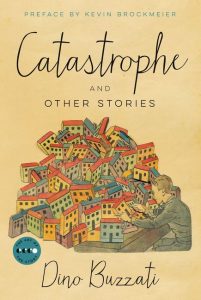 translated by Judith Landry
translated by Judith Landry
March 27, 2018 (most of the stories- originally 1965)
240 pages
Contents:
“The Collapse of the Baliverna”
“Catastrophe”
“The Epidemic”
“The Landslide”
“Just the Very Thing They Wanted”
“Oversight”
“The Monster”
“Seven Floors”
“The March of Time”
“The Alarming Revenge of a Domestic Pet”
“And Yet They Are Knocking at Your Door”
“Something Beginning With ‘L'”
“The Slaying of the Dragon”
“The Opening of the Road”
“The Scala Scare”
“Humility”
“The War Song”
“The Egg”
“The Enchanted Coat”
“The Saints”
If you love the intense, allegorical short stories of Stephen Crane and Guy de Maupassant, you’ll certainly enjoy Dino Buzzati’s Catastrophe. Filled with moments of slow-building horror and the triumph of the illogical, Buzzati’s stories will leave you feeling unnerved but also more aware of the tenuous nature of reality.
Buzzati’s stories are quiet and reflective, lacking the playfulness of Borges or the gut-punch that comes at the end of many Crane stories, but they confront us nonetheless with our own tendency to throw off the strictures of civilization and attack one another without pity. And while some of these pieces have science-fictional or fantastic elements, those elements are not the point of the stories but merely the vehicles by which Buzzati can explore such questions as “can a government create a disease that singles out its critics?” (“The Epidemic”) or “what would really happen if humans were confronted with an actual dragon?” (“The Slaying of the Dragon”).
The perniciousness of the herd mentality is a major theme in Catastrophe, with Buzzati returning to it in several stories as if running an experiment multiple times in hopes of a different result (spoiler: he’s always disappointed). “Catastrophe,” “Just the Very Thing They Wanted,” “And Yet They Are Knocking at Your Door,” and “The Scala Scare” all take up this issue, with individuals unwilling to stand out from the group to ask a question or make an important point. In “Catastrophe,” no one on a train will voice the fact that they are all seeing people fleeing from their homes across the countryside from some unknown danger. No one dares try to stop the train, because no one else is speaking up. The same occurs in “Knocking at Your Door” and “Scala Scare,” where danger, real or imagined, causes people to panic but stay together, afraid to make a move. I started to get the feeling while reading these stories that Buzzati knew quite a few people who would rather remain in precarious situations or allow terrible things to happen, just so they could save face.
Several pieces in Catastrophe are allegorical, with unnamed characters sketched against non-specific backgrounds, as in “Just the Very Thing,” “The War Song,” and “The Enchanted Coat.” Each involves violence for which those responsible refuse to acknowledge their part. And while Buzzati’s messages are timeless and ring true, these pieces aren’t as powerful as those that tell more concrete stories.
I’d have to say that “The Slaying of the Dragon” is my favorite (and one of the most disturbing pieces) in this collection because of the quiet intensity with which Buzzati tells the story of a dragon’s murder at the hands of brutal humans. One could interpret this story on many levels: a critique of war, a reflection of base human instincts, violence against creatures unlike ourselves. The count, governor and his wife, naturalist, and taxidermist who set out to hunt and kill the reported dragon do so because of some rumors, and not because the dragon is actually doing any damage. They find only that the villagers who live near the creature keep it happy by supplying it with live goats. Even though the hunters see that the dragon is infirm and uninterested in them, they shoot at it anyway, and the story only gets more disturbing, tragic, and gruesome from there.
Buzzati is one of a small group of Italian speculative authors well-known in the US, and hopefully this collection will encourage Anglophone readers to search out more stories and novels from Italy.
